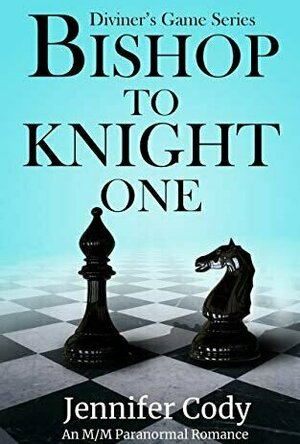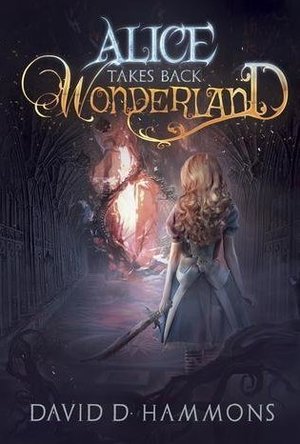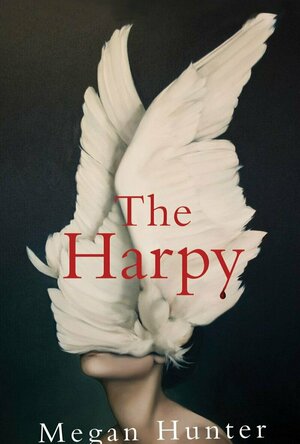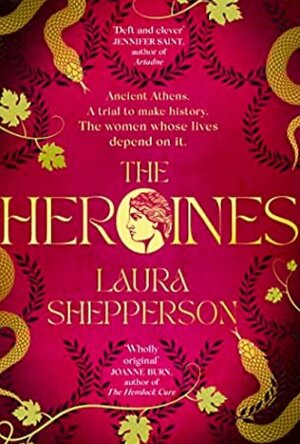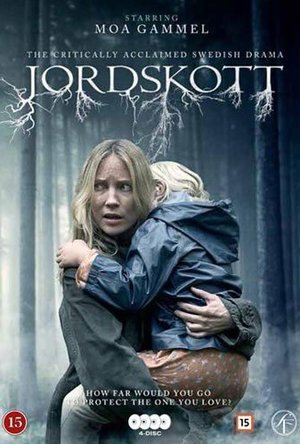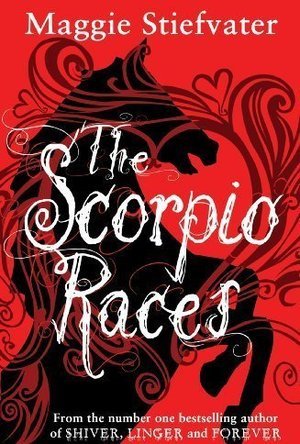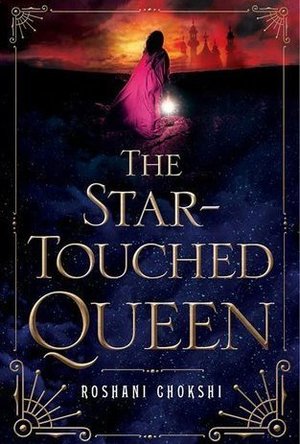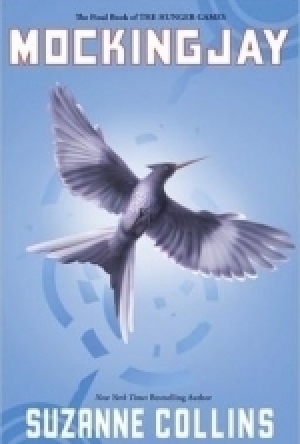Search
Search results
Merissa (12911 KP) rated Bishop to Knight One (Diviner's Game #1) in Books
Feb 12, 2021 (Updated Aug 3, 2023)
BISHOP TO KNIGHT ONE is the first book in the Diviner's Game trilogy. We enter the world of myth and magic, with Naiads, Nymphs, Obsidites, Telepaths, you name it.
Deejay takes in the unwanted sons of his sisters but ends up taking in step-sons too. One of these is Matt, supposedly human. Both Deejay and Matt fight their attraction as inappropriate in both the human and non-human worlds. Things come to light that show a ten-year difference will mean absolutely nothing as the years go by.
I loved their slow-burn, hot as hell, romance. This book is simply outstanding and had me gripped from the very beginning. I have my own list of characters that I like and dislike but will admit to being shocked with a twist at the end of this book. I really hope it is explained further in subsequent books as I really don't want to dislike this character, but his actions make me question!!!
I found the pacing to be perfect for the story, with plenty of action and romance to take me from page to page. There is intrigue, betrayal (maybe), curses, and fights. It's all here and I loved every single word.
I highly recommend this book and can't wait to continue the series. Bring it on!
* A copy of this book was provided to me with no requirements for a review. I voluntarily read this book, and the comments here are my honest opinion. *
Merissa
Archaeolibrarian - I Dig Good Books!
Feb 12, 2021
Deejay takes in the unwanted sons of his sisters but ends up taking in step-sons too. One of these is Matt, supposedly human. Both Deejay and Matt fight their attraction as inappropriate in both the human and non-human worlds. Things come to light that show a ten-year difference will mean absolutely nothing as the years go by.
I loved their slow-burn, hot as hell, romance. This book is simply outstanding and had me gripped from the very beginning. I have my own list of characters that I like and dislike but will admit to being shocked with a twist at the end of this book. I really hope it is explained further in subsequent books as I really don't want to dislike this character, but his actions make me question!!!
I found the pacing to be perfect for the story, with plenty of action and romance to take me from page to page. There is intrigue, betrayal (maybe), curses, and fights. It's all here and I loved every single word.
I highly recommend this book and can't wait to continue the series. Bring it on!
* A copy of this book was provided to me with no requirements for a review. I voluntarily read this book, and the comments here are my honest opinion. *
Merissa
Archaeolibrarian - I Dig Good Books!
Feb 12, 2021
Eilidh G Clark (177 KP) rated A Portable Shelter in Books
May 13, 2017
‘…there’s no other way to give you the truth except to hide it in a story and let you find your own way inside.’
‘…there’s no other way to give you the truth except to hide it in a story and let you find your own way inside.’
Kirsty Logan’s first collection of short stories, The Rental Heart and Other Fairytales, published by Salt in 2014, won the Polari First Book Prize in 2015. A Portable Shelter is her second collection. Set in a small cottage in the rural north coast of Scotland, Ruth and Liska are expecting their first child. The couple believe that their unborn baby will have a better chance of survival away from the harshness of suburban life. They make a pact with one another, that they will only ever tell their child the truth. Yet while Liska is asleep or Ruth is at work, each whispers secret stories to their unborn child. Delving into fantastical tales about people from their past and re-telling stories that span from generation to generation, the couple unfold the horrors of the real world. Whilst these tales, laced in myth and legend, and fattened with the magic of the imagination, demonstrate the art of oral storytelling, Logan reaches further to show the reader why storytelling is important.
While this book is primarily a collection of short stories, its novel like structure frames each story with a preceding monologue from either Ruth or Liska. The monologues offer delightful morsels of description that bring the harshness of Mother Nature into the safety of the couple’s bedroom, “right now our home is speaking to you. The walls creak their approval in the wind. The rain applauds on the roof. The lighthouse beam swoops, swoops, swoops. The tide breathes loud and slow like a giant. If you listen carefully, perhaps you can even hear the moon hum.” The pace of these sentences, combined with the delicacy of language demonstrates Logan’s skill at describing the sublime spirit of the natural world, which brings the narrative to life.
Most impressive though, is Logan’s poetic language and carefully crafted sentences which create the most beautiful imagery. In ‘Flinch,’ for example – James is a fisherman struggling with his identity, yet his affiliation with the land is locked into his first-person point of view where the reader gets to closely experience what he sees, “The sky is pinkish-grey like the insides of shells. Speckled bonxies wheel overhead. Seals loll on the rocks, fat as kings. The rising mist is cool and milky.” Any of these lines could easily be arranged into a poem and with sentences that are squeezed tight; they create a wonderful poetic rhythm. Logan uses this technique throughout her novel, demonstrating the precision and craft in her work. There are definite similarities in her writing style to fellow Scottish novelist and poet Jenni Fagan. Both authors use rich language, which is well crafted and smattered with vernacular. Furthermore, combining this with the reoccurring theme of identity, the oral storytelling tradition, landscape, folklore, and myth, it is clear to see why these authors contribute to the growing canon in Scottish literature.
This is a book that I will read over and over again because I know that in each reading, I will find something new. A Portable Shelter, I feel, deserves a place on my ‘keep’ book shelf.
A Portable Shelter, Kirsty Logan, London: Vintage, 2015
Kirsty Logan’s first collection of short stories, The Rental Heart and Other Fairytales, published by Salt in 2014, won the Polari First Book Prize in 2015. A Portable Shelter is her second collection. Set in a small cottage in the rural north coast of Scotland, Ruth and Liska are expecting their first child. The couple believe that their unborn baby will have a better chance of survival away from the harshness of suburban life. They make a pact with one another, that they will only ever tell their child the truth. Yet while Liska is asleep or Ruth is at work, each whispers secret stories to their unborn child. Delving into fantastical tales about people from their past and re-telling stories that span from generation to generation, the couple unfold the horrors of the real world. Whilst these tales, laced in myth and legend, and fattened with the magic of the imagination, demonstrate the art of oral storytelling, Logan reaches further to show the reader why storytelling is important.
While this book is primarily a collection of short stories, its novel like structure frames each story with a preceding monologue from either Ruth or Liska. The monologues offer delightful morsels of description that bring the harshness of Mother Nature into the safety of the couple’s bedroom, “right now our home is speaking to you. The walls creak their approval in the wind. The rain applauds on the roof. The lighthouse beam swoops, swoops, swoops. The tide breathes loud and slow like a giant. If you listen carefully, perhaps you can even hear the moon hum.” The pace of these sentences, combined with the delicacy of language demonstrates Logan’s skill at describing the sublime spirit of the natural world, which brings the narrative to life.
Most impressive though, is Logan’s poetic language and carefully crafted sentences which create the most beautiful imagery. In ‘Flinch,’ for example – James is a fisherman struggling with his identity, yet his affiliation with the land is locked into his first-person point of view where the reader gets to closely experience what he sees, “The sky is pinkish-grey like the insides of shells. Speckled bonxies wheel overhead. Seals loll on the rocks, fat as kings. The rising mist is cool and milky.” Any of these lines could easily be arranged into a poem and with sentences that are squeezed tight; they create a wonderful poetic rhythm. Logan uses this technique throughout her novel, demonstrating the precision and craft in her work. There are definite similarities in her writing style to fellow Scottish novelist and poet Jenni Fagan. Both authors use rich language, which is well crafted and smattered with vernacular. Furthermore, combining this with the reoccurring theme of identity, the oral storytelling tradition, landscape, folklore, and myth, it is clear to see why these authors contribute to the growing canon in Scottish literature.
This is a book that I will read over and over again because I know that in each reading, I will find something new. A Portable Shelter, I feel, deserves a place on my ‘keep’ book shelf.
A Portable Shelter, Kirsty Logan, London: Vintage, 2015
Sophia (Bookwyrming Thoughts) (530 KP) rated Alice Takes Back Wonderland in Books
Jan 23, 2020
Review copy provided by the publisher via Netgalley
This review and more can be found at <a href="http://www.inwonderlandbookblog.com/2016/01/alice-takes-back-wonderland-review.html">In Wonderland</a>
Alice Takes Back Wonderland is one peculiar book – it took awhile for me to get into the story, but not bad overall (I've read worse).
The main character, Alice, is a little similar to Alyssa from Splintered – she talks to bugs and flowers, and they talk to her as well. And unlike Alyssa, who keeps her "ability" a secret, those around Alice assume she's a nutcase – she's been assumed to have schizophrenia along with ADHD. Alice also isn't related to Wonderland Alice – she just ended up going down the rabbit hole at seven and came back a completely different person.
Years later, just when Alice thinks everything in Wonderland was an imagination, the White Rabbit appears again to bring Alice back to save Wonderland. There, Ace of Spades has taken over the land and has been trying to "humanize" the creatures by taking the wonder out of them, thus taking Alice back down the rabbit hole once more.
When Hammons introduces us to Wonderland and Alice tries to reunite with the creatures she met when she was seven, it's really hard to get into the story (and at the beginning too – no fun). There's a lot of nonsense going on in Wonderland with very little sense – I haven't read Alice In Wonderland by Lewis Carroll myself, but I personally think Hammons did a pretty good job trying to capture the nonsensical aspect Carroll uses in the original story.
Now, in the case of getting me to read the story, however, I'm starting to think I should just call it off (much to Ella's dismay).
As soon as Alice leaves Wonderland to recruit other kingdoms (fairy tales), on the other hand, the story becomes less nonsensical and more of something that I could fully comprehend and wrap my head around. (I got the gist of Wonderland – I did not understand what all the creatures were saying.) Hammons introduces us Peter Pan and the Lost Boys, Pinocchio, Cinderella, Snow White, Sleeping Beauty – all recognizable in some way. But that's not all the fairy tales involved.
Hammons also throws in heroes of myth and legend as well – people such as Joan the Ark, Hercules, King Arthur, Loki, etc. At that point, I pretty much took a step back (or almost) from the book. There are way too many tales involved in this battle to take back Wonderland and stop the Ace of Spades from taking the wonder out of everyone. Those characters don't play a major role like Peter Pan, Pinocchio, Snow White, and all the ones mentioned earlier, so it's less confusing. I just think Hammons should have kept it strictly at fairy tales rather than all of them.
(I'll give him this: all of them are individual kingdoms instead of mushed together into one. Less confusing.)
To make it worse, most of the characters also play multiple roles, which I won't say because I might spoil something. But still – too much myth and legend is mentioned in this vast world Hammons creates.
Overall, not bad for a book that takes far too many tales into its plot. It takes some time to get used to the story, but once you get past Wonderland's bit of remaining nonsense and enter Neverland and the Grimm Kingdom, the story has an adventure or two as Alice learns that maybe fairy tales aren't as literal as they seem.
This review and more can be found at <a href="http://www.inwonderlandbookblog.com/2016/01/alice-takes-back-wonderland-review.html">In Wonderland</a>
Alice Takes Back Wonderland is one peculiar book – it took awhile for me to get into the story, but not bad overall (I've read worse).
The main character, Alice, is a little similar to Alyssa from Splintered – she talks to bugs and flowers, and they talk to her as well. And unlike Alyssa, who keeps her "ability" a secret, those around Alice assume she's a nutcase – she's been assumed to have schizophrenia along with ADHD. Alice also isn't related to Wonderland Alice – she just ended up going down the rabbit hole at seven and came back a completely different person.
Years later, just when Alice thinks everything in Wonderland was an imagination, the White Rabbit appears again to bring Alice back to save Wonderland. There, Ace of Spades has taken over the land and has been trying to "humanize" the creatures by taking the wonder out of them, thus taking Alice back down the rabbit hole once more.
When Hammons introduces us to Wonderland and Alice tries to reunite with the creatures she met when she was seven, it's really hard to get into the story (and at the beginning too – no fun). There's a lot of nonsense going on in Wonderland with very little sense – I haven't read Alice In Wonderland by Lewis Carroll myself, but I personally think Hammons did a pretty good job trying to capture the nonsensical aspect Carroll uses in the original story.
Now, in the case of getting me to read the story, however, I'm starting to think I should just call it off (much to Ella's dismay).
As soon as Alice leaves Wonderland to recruit other kingdoms (fairy tales), on the other hand, the story becomes less nonsensical and more of something that I could fully comprehend and wrap my head around. (I got the gist of Wonderland – I did not understand what all the creatures were saying.) Hammons introduces us Peter Pan and the Lost Boys, Pinocchio, Cinderella, Snow White, Sleeping Beauty – all recognizable in some way. But that's not all the fairy tales involved.
Hammons also throws in heroes of myth and legend as well – people such as Joan the Ark, Hercules, King Arthur, Loki, etc. At that point, I pretty much took a step back (or almost) from the book. There are way too many tales involved in this battle to take back Wonderland and stop the Ace of Spades from taking the wonder out of everyone. Those characters don't play a major role like Peter Pan, Pinocchio, Snow White, and all the ones mentioned earlier, so it's less confusing. I just think Hammons should have kept it strictly at fairy tales rather than all of them.
(I'll give him this: all of them are individual kingdoms instead of mushed together into one. Less confusing.)
To make it worse, most of the characters also play multiple roles, which I won't say because I might spoil something. But still – too much myth and legend is mentioned in this vast world Hammons creates.
Overall, not bad for a book that takes far too many tales into its plot. It takes some time to get used to the story, but once you get past Wonderland's bit of remaining nonsense and enter Neverland and the Grimm Kingdom, the story has an adventure or two as Alice learns that maybe fairy tales aren't as literal as they seem.
Deborah (162 KP) rated What Matters in Jane Austen?: Twenty Crucial Puzzles Solved in Books
Dec 21, 2018
This book is subtitled "Twenty Crucial Puzzle Solved". I'm not sure I quite agree with that - it's more a case of throwing some light on areas of the novels that may puzzle a modern reader but would have been plain to a contemporary audience.
For example, there is a chapter on the games played in the novels. No one (that I know!) plays at Speculation any more, but we can grasp both the fundamentals of the game ("I am never to see my cards and Mr Crawford does all the rest" as Lady Bertram puts it!) and read into it some further illumination of the participating characters. And of course understand why Sir Thomas thought that it might not amuse him to have wife wife as a partner in Whist!
There are sections on characters who have no reported speech (it had not occurred before that we never hear Captain Benwick speak, but it is quite true!), clears away the myth that there are no scenes where women are not present and wraps up with an important consideration of Jane Austen's place in the development of the novel. I think that as she is so very readable, and perhaps also because she is a woman writer, people in general are too apt to dismiss her importance, but her innovations in style are immeasurable. I don't think it is going too far to say that without Austen the novel would not have developed in the way it has. If you read Henry James, Flaubert, Kafka and a long et cetera, you best give your thanks to Jane Austen!
For example, there is a chapter on the games played in the novels. No one (that I know!) plays at Speculation any more, but we can grasp both the fundamentals of the game ("I am never to see my cards and Mr Crawford does all the rest" as Lady Bertram puts it!) and read into it some further illumination of the participating characters. And of course understand why Sir Thomas thought that it might not amuse him to have wife wife as a partner in Whist!
There are sections on characters who have no reported speech (it had not occurred before that we never hear Captain Benwick speak, but it is quite true!), clears away the myth that there are no scenes where women are not present and wraps up with an important consideration of Jane Austen's place in the development of the novel. I think that as she is so very readable, and perhaps also because she is a woman writer, people in general are too apt to dismiss her importance, but her innovations in style are immeasurable. I don't think it is going too far to say that without Austen the novel would not have developed in the way it has. If you read Henry James, Flaubert, Kafka and a long et cetera, you best give your thanks to Jane Austen!
This frankly stunning book, begins like many women’s normal, everyday evenings: getting the children ready for bed on their own, waiting for their husband to get in from their commute.
Lucy enjoys her alone time think, and enjoys the time she spends with her children. She works from home since having had the children. She had a good job, had even started to study for a PhD at one point, and she appears to be happy with her life as it is. Until an unexpected phone call one evening. Jake, her husband, is late home from work, and the stranger on the phone tells Lucy that her husband is having an affair with his wife. Lucy is stunned. Jake is full of remorse when she tells him, and he tells her that she can punish him three times - as long as they stay together.
This book looks at how punishment skirts very closely to revenge, and the effect that it can have on your own sanity. It uses mythology and the myth of the Harpy, to exact that revenge. As time progresses and Lucy becomes more embroiled in her Harpy-like acts of revenge, there are excerpts that seem to come from a Harpy’s point of view. I liked these parts. They seemed to revel in the feelings of vengeance, something that all ‘nice’ girls are taught not to do. Instead of turning the other cheek, Lucy goes for full-on retribution.
I thoroughly enjoyed this. It’s a short, totally absorbing read, and is the second book I’ve read and enjoyed by Megan Hunter. I’m looking forward to whatever comes next!
Lucy enjoys her alone time think, and enjoys the time she spends with her children. She works from home since having had the children. She had a good job, had even started to study for a PhD at one point, and she appears to be happy with her life as it is. Until an unexpected phone call one evening. Jake, her husband, is late home from work, and the stranger on the phone tells Lucy that her husband is having an affair with his wife. Lucy is stunned. Jake is full of remorse when she tells him, and he tells her that she can punish him three times - as long as they stay together.
This book looks at how punishment skirts very closely to revenge, and the effect that it can have on your own sanity. It uses mythology and the myth of the Harpy, to exact that revenge. As time progresses and Lucy becomes more embroiled in her Harpy-like acts of revenge, there are excerpts that seem to come from a Harpy’s point of view. I liked these parts. They seemed to revel in the feelings of vengeance, something that all ‘nice’ girls are taught not to do. Instead of turning the other cheek, Lucy goes for full-on retribution.
I thoroughly enjoyed this. It’s a short, totally absorbing read, and is the second book I’ve read and enjoyed by Megan Hunter. I’m looking forward to whatever comes next!
ClareR (5879 KP) rated The Heroines in Books
Oct 29, 2023
Greek mythology is pretty much an insta-buy and read for me. I’m drawn to historical fiction anyway, and the Greek myths have always felt like an extension of that for me. That’s probably also why I’m especially attracted to the type of Greek myths that are so popular at the moment. I suppose it could be referred to more as Greek historical fiction rather than myth. The Gods and Goddesses have been taken out of the equation (inasmuch as Christian figures are in other historical fiction novels - they’re spoken of, but they don’t have a leading role), and the mortals are left to make their own life choices - even if they still like to blame it on the Gods.
Laura Shepperson gives voice to the women in the myths, and we see the story of Theseus and Phaedra from Phaedra’s point of view. There’s also a chorus of women who are suffering under the mistreatment of the men in Theseus’ palace. Servants and slave women had to do as they were told. The struggle for the women against this patriarchal system is at times violent, and the women rarely come out of it well.
There were a lot of characters in this, and I wonder if all of them were necessary. I’ll be honest, and it could be down to the good ole peri-meno brain, I did get a little confused at all the characters, but it didn’t spoil the story!
I enjoyed this quick read (ok, I didn’t put it down!). It gave me enjoyment for a couple of days - and that’s what reading is all about really, isn’t it!
Laura Shepperson gives voice to the women in the myths, and we see the story of Theseus and Phaedra from Phaedra’s point of view. There’s also a chorus of women who are suffering under the mistreatment of the men in Theseus’ palace. Servants and slave women had to do as they were told. The struggle for the women against this patriarchal system is at times violent, and the women rarely come out of it well.
There were a lot of characters in this, and I wonder if all of them were necessary. I’ll be honest, and it could be down to the good ole peri-meno brain, I did get a little confused at all the characters, but it didn’t spoil the story!
I enjoyed this quick read (ok, I didn’t put it down!). It gave me enjoyment for a couple of days - and that’s what reading is all about really, isn’t it!
Acanthea Grimscythe (300 KP) rated Jordskott - Season 1 in TV
May 12, 2018
If you’re looking for something in the flavor of Grimm and Supernatural, the Swedish drama Jordskott may be right up your alley. Despite being found on horror streaming service Shudder, the series doesn’t have a whole bunch of the horror elements. What it does have, for the first season at least, is a decent storyline.
The characters in Jordskott are rather bland, unfortunately and they are not its strong point. The main character, Eva Thörnblad is an heiress who returns home to where seven years ago, her daughter Josefine disappeared. Much of her role in the series involved losing cars (she went through three in the first season), disobeying orders, brazenly rushing into things, and deflecting an all too beautifully sweet love interest. (I adore Tom Aronsson as a character.) After she’s put on leave from her job in Stockholm dealing with hostage negotiation, she manages to get herself brought onto the Silverhöjd case.
Wass is, perhaps, the strongest of the characters we meet, and certainly does the most actively throughout the first season.
In this world, myth blends into fantasy, bringing several creatures from Scandinavian and Norwegian lore into the story. These creatures are surfacing more and more frequently as the forest, facing certain doom from the company that Eva’s father founded, reacts angrily to human actions. It’s really a reminder that we should consider the natural world around us for what it is: a boon to our lives.
I lost interest in the second season, as it seems to mostly be a rehash of the first, with a slightly altered storyline. Now it’s something big in Stockholm that’s upsetting natural order, versus Silverhöjd. This series is definitely worth a watch of at least the first season.
The characters in Jordskott are rather bland, unfortunately and they are not its strong point. The main character, Eva Thörnblad is an heiress who returns home to where seven years ago, her daughter Josefine disappeared. Much of her role in the series involved losing cars (she went through three in the first season), disobeying orders, brazenly rushing into things, and deflecting an all too beautifully sweet love interest. (I adore Tom Aronsson as a character.) After she’s put on leave from her job in Stockholm dealing with hostage negotiation, she manages to get herself brought onto the Silverhöjd case.
Wass is, perhaps, the strongest of the characters we meet, and certainly does the most actively throughout the first season.
In this world, myth blends into fantasy, bringing several creatures from Scandinavian and Norwegian lore into the story. These creatures are surfacing more and more frequently as the forest, facing certain doom from the company that Eva’s father founded, reacts angrily to human actions. It’s really a reminder that we should consider the natural world around us for what it is: a boon to our lives.
I lost interest in the second season, as it seems to mostly be a rehash of the first, with a slightly altered storyline. Now it’s something big in Stockholm that’s upsetting natural order, versus Silverhöjd. This series is definitely worth a watch of at least the first season.
Rachel King (13 KP) rated The Scorpio Races in Books
Feb 11, 2019
I loved this book right from the beginning. Though I am familiar with Maggie Stiefvater's writing style from other books, reading it in this one still felt fresh and new. I loved her imagery and witticism and how she described people and situations in new ways to me.
There is a major emphasis on all aspects of horses, and not just because of the existence of the water horses. Though the author pulls the water horses from mythology, much of their origins and abilities are cloaked in mystery. Sean Kendrick is one of the few on the island that understands the water horses -- both how to control them and respect them, as well as how to care for them properly -- though he does not share his knowledge with anyone. The fantastical elements of the water horses are understated, as they are more of a catalyst for the budding romance between Sean and Puck.
Sean is as much of a mystery as the water horses. The other inhabitants of the island respect him, but keep their distance. As a regular winner of the Scorpio Races, sean is the expected winner, but his attraction to Puck makes things unpredictable and unprecedented.
Puck is easy to like. She loves her horse, she loves her brothers, and she loves the island. She likes life simple and her motivations are not for wealth, but to keep her home and her family just as it is. Of course, life never stays stagnant, and her spontaneous entry into the Scorpio Races sparks enough conflict and controversy to change her life forever.
While I learned much more about horses than I would ever seek to learn otherwise, the book is more of a love story than a horse myth come to life, and I loved every word of it.
There is a major emphasis on all aspects of horses, and not just because of the existence of the water horses. Though the author pulls the water horses from mythology, much of their origins and abilities are cloaked in mystery. Sean Kendrick is one of the few on the island that understands the water horses -- both how to control them and respect them, as well as how to care for them properly -- though he does not share his knowledge with anyone. The fantastical elements of the water horses are understated, as they are more of a catalyst for the budding romance between Sean and Puck.
Sean is as much of a mystery as the water horses. The other inhabitants of the island respect him, but keep their distance. As a regular winner of the Scorpio Races, sean is the expected winner, but his attraction to Puck makes things unpredictable and unprecedented.
Puck is easy to like. She loves her horse, she loves her brothers, and she loves the island. She likes life simple and her motivations are not for wealth, but to keep her home and her family just as it is. Of course, life never stays stagnant, and her spontaneous entry into the Scorpio Races sparks enough conflict and controversy to change her life forever.
While I learned much more about horses than I would ever seek to learn otherwise, the book is more of a love story than a horse myth come to life, and I loved every word of it.
Kyera (8 KP) rated The Star-Touched Queen (The Star-Touched Queen, #1) in Books
Feb 1, 2018
The Star-Touched Queen is a little slow to start, but once it finds a groove the story will draw you in and you won't want to put it down. The writing style is very poetic and descriptive, which is absolutely gorgeous but can sometimes slow down the story. Those pacing issues continue throughout the story. Sometimes the book flows well and you find yourself reading through chapters in no time, while other times the writing or plot trips you up and slows down the story.
I was very intrigued by the premise of the story, as not only does it include elements of Indian folklore but it is a re-telling of the Hades and Persephone myth. As a huge fan of Greek mythology, that was the aspect of the story that I was most excited to experience. Amar and Maya are our Hades and Persephone, although it is a unique story and you don't feel like you're reading a re-telling.
As strange as it seems, my favourite character was actually the demon horse Kamala. Although she could be really creepy when she salivated over eating people, she could be funny and made some of the scenes for me. Although I liked Amar, Maya and the other supporting characters I didn't relate strongly to any of them so it made me less invested in the book. I wish I did like them more because I would have loved to have stronger feelings about this gorgeous book.
Overall, I really enjoyed reading this book and would recommend it - but it didn't make any strong or lasting impact on me. Readers who are fans of flowery prose and very descriptive writing will enjoy Roshani Chokshi's writing style, but if you are a fan of more simple sentences you might have difficultly getting through this book.
I was very intrigued by the premise of the story, as not only does it include elements of Indian folklore but it is a re-telling of the Hades and Persephone myth. As a huge fan of Greek mythology, that was the aspect of the story that I was most excited to experience. Amar and Maya are our Hades and Persephone, although it is a unique story and you don't feel like you're reading a re-telling.
As strange as it seems, my favourite character was actually the demon horse Kamala. Although she could be really creepy when she salivated over eating people, she could be funny and made some of the scenes for me. Although I liked Amar, Maya and the other supporting characters I didn't relate strongly to any of them so it made me less invested in the book. I wish I did like them more because I would have loved to have stronger feelings about this gorgeous book.
Overall, I really enjoyed reading this book and would recommend it - but it didn't make any strong or lasting impact on me. Readers who are fans of flowery prose and very descriptive writing will enjoy Roshani Chokshi's writing style, but if you are a fan of more simple sentences you might have difficultly getting through this book.
David McK (3562 KP) rated Mockingjay in Books
Jan 28, 2019
The third and final book in Suzanne Collin's <i>The Hunger Games</i> trilogy, in which the (I found) the whole proved to be greater than the sum of its parts.
Like the previous two entries, this is again told in the first-person immediate sense, and is again a 'true' sequel - don't even bother trying to read this without the first two!
Picking up from the end of <i>Catching Fire</i>, Katniss (and some other victors) has been rescued from the 75th annual Hunger Games by the previously-thought-to-be-a-myth survivors of District 13. Not all have made it out, however, Peeta (and two other victors) have been captured by the Capitol, who are now in the process of torturing them for information as the other Districts (1 through 12) rise up against teh Capitol.
This, then, is pretty much a war story, and doesn't shy away from the realities of such (albeit also somewhat sanitized), with characters dropping left, right and centre in unexpected moments, and with Katniss suffering further mental scarring as a result.
But if the Capitol falls, what will rise to replace it?
As a series over-all, I'll admit I wasn't too sure about it at first, and that it took a while for me to get used to the format in which it was told. The every-chapter-must-end-on-a-cliffhanger approach might have been a bit too much for my tastes, but in the end you just had to go with it (think of it like those old TV episodes that did the same!). Individually, the stories were enjoyable enough but nothing special, but put together as one whole arc (and read back to back) I have to say, it proved to be better than I was expecting.
Like the previous two entries, this is again told in the first-person immediate sense, and is again a 'true' sequel - don't even bother trying to read this without the first two!
Picking up from the end of <i>Catching Fire</i>, Katniss (and some other victors) has been rescued from the 75th annual Hunger Games by the previously-thought-to-be-a-myth survivors of District 13. Not all have made it out, however, Peeta (and two other victors) have been captured by the Capitol, who are now in the process of torturing them for information as the other Districts (1 through 12) rise up against teh Capitol.
This, then, is pretty much a war story, and doesn't shy away from the realities of such (albeit also somewhat sanitized), with characters dropping left, right and centre in unexpected moments, and with Katniss suffering further mental scarring as a result.
But if the Capitol falls, what will rise to replace it?
As a series over-all, I'll admit I wasn't too sure about it at first, and that it took a while for me to get used to the format in which it was told. The every-chapter-must-end-on-a-cliffhanger approach might have been a bit too much for my tastes, but in the end you just had to go with it (think of it like those old TV episodes that did the same!). Individually, the stories were enjoyable enough but nothing special, but put together as one whole arc (and read back to back) I have to say, it proved to be better than I was expecting.
